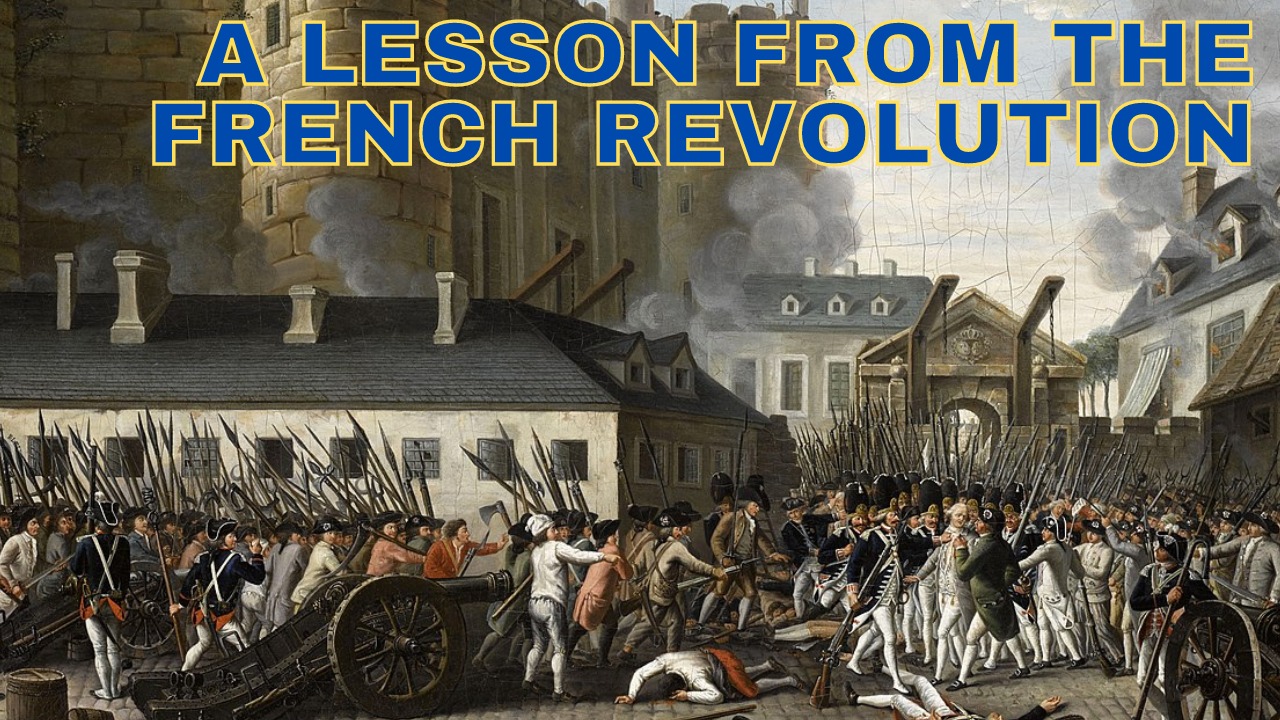A LESSON FROM THE FRENCH REVOLUTION

One of the most cataclysmic periods in modern history was the French Revolution, which started in the late 1780s and continued until the mid-1790s. What began as a popular revolution against royal sovereignty, and against the power of the aristocracy and the church, eventually descended into a frenzy of violence and bloodshed. The heavily orchestrated anarchy of the “Reign of Terror”, as it became known, was promoted by the revolution’s enthusiasts as a necessary instrument to ensure a proper break with the ancien regime that had dominated France for centuries.
The prime mover behind the more extreme elements of the revolution, and ultimately the leader of its most violent phase, was Maximilien Robespierre (1758-1794), a small-town lawyer from humble origins who used his rhetorical skills and single-minded dedication to the revolutionary cause to propel himself to the top.
Robespierre was heavily influenced by the purist political philosophy of Jean-Jacques Rousseau (1712-1778), and frequently cited Rousseau’s ideas in his speeches and writings. Robespierre admired Rousseau’s emphasis on popular sovereignty, the general will, and civic virtue, and he saw these ideas as crucial to the success of the French Revolution.
Rousseau’s abhorrence for the existing order fed heavily into Robespierre’s vehement opposition to the monarchy and aristocracy – which exceeded the attitude of the moderate revolutionaries who aimed for a constitutional monarchy – and consequently, Robespierre played a key role in the execution of the French king, Louis XVI, and his wife, Queen Marie Antoinette.
Eventually, however, as the Reign of Terror became ever more unendurable even for his fellow revolutionaries, and after having several of his former fellow travelers guillotined based on paranoid accusations of disloyalty to the revolution, Robespierre’s popularity waned, and he was arrested and then executed by guillotine on July 28, 1794.
One of the most astounding aspects of Robespierre’s brief stint at the top is that he was universally known – if somewhat begrudgingly by his enemies – as “the incorruptible”, a title he earned because of his solid reputation for honesty and integrity, and his utter dedication to the principles of the revolution. He was recognized as a man of unwavering principles who could not be bribed or influenced by personal gain or political favors.
Robespierre never married and was notorious for his austere, ascetic lifestyle, focusing all his energy on his political career rather than pursuing romantic relationships or personal interests. This contrasted with his predecessor as head of the revolution, Honoré Gabriel Riqueti de Mirabeau (1749-1791), who played a key role in drafting the Declaration of the Rights of Man, but whose reputation was later tarnished by allegations of corruption, after it was discovered that he accepted money and gifts from King Louis.
What is astounding about Robespierre being known as “the incorruptible” is that he is simultaneously acknowledged as a murderous monster of a man, who was personally responsible for the summary execution of thousands of innocent people – some estimates suggest that as many as 40,000 people were executed during the Reign of Terror, which lasted for a year – while he also presided over the arrest of hundreds of thousands of others, and the misery of millions. How exactly can his raw use of power and flagrant facilitation of violence have ever been correlated with incorruptibility?
I think the answer lies in a distortion of the meaning of corrupt, which, beginning in the Age of Enlightenment, and sadly ever since, has become associated with integrity that is purely material, unassociated with anything metaphysical or God-related. As long as someone’s amorality and wickedness are tied to a “just” cause, and not to personal gain, they cannot be considered corrupt – or so the argument goes.
Robespierre was very forthright about this idea, openly declaring that “virtue without terror is impotent.” To him virtue and terror were interlinked, and if the objective of terror was a “just” cause, the end always justified the means.
It goes without saying that Judaism utterly rejects this warped ideal. Evidence can be found throughout the Hebrew scriptures and Talmud that any result achieved via insufferable acts is considered abhorrent, even if that result is desirable. Proverbs declares that it is “better to be hapless and blameless, than to be successful and crooked.” (Prov. 28:6).
The Talmud informs us that Joab, King David’s nephew and military chief-of-staff, was ultimately executed as much for his underhanded tactics and personal-agenda driven extra-judicial killings as he was for his treachery (San. 49a).
And there is also a wonderful Midrash on Parshat Pekudei which perfectly encapsulates this ideal. According to R. Tanḥuma bar Abba, the verse in Proverbs (28:20), אִישׁ אֱמוּנוֹת רַב בְּרָכוֹת – “a trustworthy man will receive many blessings,” is talking about to Moses. Although Moses is not mentioned by name, he is hinted at via word association, based on the biblical verse (Num. 12:7): בְּכָל בֵּיתִי נֶאֱמָן הוּא – “[Moses] is trusted throughout My household.”
In his Mikdash HaLevi commentary on the parsha, my grandfather, Rav Yosef Tzvi Dunner (1913-2007), notes that Proverbs uses the plural “emunot” to describe trustworthiness, as opposed to “emunah,” in the singular. His explanation for this anomaly is nothing short of inspirational. Integrity and trustworthiness have no value, he says, if they are entirely temporal, namely: based on a human being’s limited ability to determine right from wrong. Consequently, we must always be aware that there is a parallel, divine strand of “ne’emanut” – trustworthiness – that runs alongside its worldly counterpart, without which integrity and trustworthiness have no intrinsic value.
If it is just emunah, and not emunot, in the plural, even “the incorruptible” can become a mass murderer of epic proportions. But Moshe was an “ish emunot” – he possessed integrity that was both of this world and of the spiritual realm – which was why he was beloved by God, and why his example as a beacon of true incorruptibility has endured for all time.

